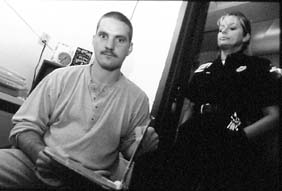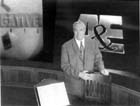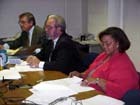
Inmate Doug Wilson housed at LaGrange, photo by Peggy Blythe .
If you can't do the time...
A&E Investigative Reports goes behind bars with Kentucky's Parole Board
by Rhonda Reeves
"I never heard the word sodomy till I was arrested for it," says convicted rapist Michael Hesson (housed at the Kentucky Reformatory in LaGrange).
Have we stumbled on to a cable rerun of the Shawshank Redemption? Something new from the Coen Brother s?
s?
Actually, it's a segment of A&E's Investigative Reports - this one profiling Kentucky's Parole Board - a veritable Gong Show for the state's criminal element. A string of inmates parades before the Board, making their best case for early release.
What are you going to do with a guy who vehemently insists he's innocent, bitterly complaining his ONLY mistake was putting his name on a piece of paper (his confession)? But then he blurts out "next time I'll know better."
Next time?
Viewers see that in many cases, the state isn't exactly locking up the guys voted most likely to invent cold fusion. (Attending a recent parole hearing at nearby Blackburn, most offenders were lucky to have an 8th-10th grade education. Sadly.)
Whether you want to laugh or cry (or lock the doors), the case is another day in the business of the parole board. A&E has been profiling parole boards across the country as part of its ongoing examination of the American criminal justice system. (The first installment of the program featured the Nevada Parole Board.)
Not every inmate was thrilled with the way A&E viewers will see them.
Nobody Knows the Trouble They've Seen
The parole board has the weighty responsibility of deciding whether a convicted criminal merits an early release. Have they earned the right to live among us, albeit with supervision and restrictions?
“The Parole Board is not in a position to retry any offender’s case, so we do n’t. The Parole Board does not play the ‘what if’ game. Decisions are made with the facts at hand.”
n’t. The Parole Board does not play the ‘what if’ game. Decisions are made with the facts at hand.”
—Linda Frank, chair, Kentucky Parole Board
Linda Frank, Chair of Kentucky's Parole Board, explained the Board cannot retry the cases although that is what some of the offenders clearly want. She clarifies what the Parole Board can and can't do: "The Parole Board does not impose punishment. Consequently, the Parole Board cannot lessen any offender's punishment. Parole is not about shortening an offender's sentence. The only way an offender in Kentucky can be held accountable for the full sentence imposed by the Court is for him to serve a portion of the sentence incarcerated and serve the balance in the community on parole supervision." (For example, many are unaware that Kentucky inmates are allotted an automatic "good time" allowance of 25 percent of their sentence-meaning a hundred-year sentence would be automatically reduced to 75 years, just by virtue of walking through the prison gates.)
On the A&E program, Doug Wilson, one of the three inmates selected for the broadcast, clearly wanted to engage the board in a new trial.
He began serving his 16-year sentence for nine counts of criminal attempt to commit murder in October of 1991. He confessed and pleaded guilty to an attempt to smother his then 4-month old daughter on several occasions. His case became popularly, if not legally, known as one of Kentucky's few Munchausen Syndrome by Proxy cases, an extremely rare disorder in men.
Any mention of the syndrome was dropped from the program because he did not have a confirmed psychiatric diagnosis (though he seemed to many to display certain hallmarks, such as medical and paramedic knowledge, desire to appear "heroic" to the mother of his daughter, present during the episodes, denial, and so on).
It's the sort of unusual and sensational allegation normally confined to reruns of L.A. Law, Law and Order, E.R.,Chicago Hope, and Made-for-Lifetime movies - where a parent systematically does their child physical harm (injury, poison, etc.) and then "rescues" them. His official charge was nine counts of criminal attempt to commit murder. (At least nine counts of apnea were diagnosed in his daughter that he was later charged with inducing.)
Munchausen Syndrome by Proxy is not a legal charge; it's defined as a psychiatric disorder, within the class of "factitious disorders," according to the American Psychiatric Association. Dr. Marc Feldman says in an MSBP case, the patient will "falsify illness in another person (such as their own children) in order to garner attention and sympathy for themselves as the heroic caregiver." He adds, "the MSBP perpetrator might induce 'apnea', (a cessation of breathing) by suffocating her child to the point of unconsciousness, then frantically display the limp child to the hospital or clinic staff as the tears roll down her cheeks..."
According to Feldman, "The MSBP parent is on a misguided mission to feel 'special,'to garner attention..." He cites the mortality rate for victims of this type of abuse at nearly 10 percent.
Interestingly, producer/director Brent Pierson acknowledges, "many inmates have committed their crimes - at least in part - in an effort to gain attention, and participating in a project such as this one certainly reinforces that."
He says, "[Wilson] wants the world to see him in a way different than we do. He's there to spin."
Pierson notes that Wilson "wasn't straight" with him and the crew about many facts of his case, but thinks that most of that appears clearly in the program. Everything, according to Wilson, has been "misconstrued" or is one big "misunderstanding" ... until he goes before the board. And "when they call him on his writeups, the camera is right on him. [He'd had] ten writeups including several for inappropriate sexual behavior," all of which he explained as "horseplay."
Wilson is the only inmate included in the May 24 program who is ordered to serve out his sentence. In their decision, the Board cited the serious and violent nature of criminal acts, including repetition; failure to take responsibility for criminal behavior; lack of remorse; and crime victim impact.
Wilson also undergoes the most radical change in demeanor over the course of the program.
Initially, Pierson characterized him as being like "a choirboy [or] boy scout when he's talking to us," but then when the board confronts him with his write-ups, and challenges his assertion that his confession was only about "keeping the family together" (Frank asks him, "why would admitting to trying to kill your daughter be a good way to keep your family together?") - and then orders him to serve out his sentence - his anger becomes apparent, and he characterizes the system of parole as "fucked."
He maintains that his only mistake was putting his name on a piece of paper (his confession), but it's impossible to miss his slips of the tongue (like the aforementioned "next time I'll know better.") Or as a prosecutor points out, his constant protestations that he "loved his daughter to death" didn't really do him any favors.
Contacted at the Reformatory, in followup to the A&E project, Wilson is not especially pleased with the way the segment turned out. Six months later, he is still protesting his innocence (insisting on being photographed with all the legal documents that he says prove his innocence - documents he says he plans to show his daughter when he is released -adding, "by 2003, she'll be 16, I'm just going to let her go by the paperwork. I have two or three thousand documents to be viewed. She'll be able to make up her own mind," he asserts confidently. His arm is decorated with a tatoo of his children's names.)
Asked if he still thinks the parole process is "fucked up," he responds, "yes ma'am...but they beeped that out of the show."
His defense has lost no zeal, "when I seen the parole board I had black and white proof that I should never have been convicted on this charge."
In response to the statement that the Parole Board doesn't determine guilt, and that his claims of innocence might be better handled by an appeal, he admits that "the terms of the plea agreement" prevent him from pursuing an appeal. (Under the plea, he would've confessed to the crime and then pleaded guilty.) He admits ruefully, "on the type of plea agreement I took, I cannot contest it no more."
Frank responds to his allegation with the statement, "he entered a guilty plea to nine counts of Criminal Attempt to Commit Murder. Therefore, he is guilty as far as the Parole Board is concerned."
As for the process itself, she explains, "Any offender who is incarcerated in a Department of Corrections institution has either entered a guilty plea or been found guilty by a judge or jury of the offense(s) for which he is convicted. The Parole Board enters every parole consideration hearing with the presumption that they are considering parole for a guilty offender. Offenders who profess their innocence are told that for the purposes of the parole consideration hearing that they are presumed guilty and that we will proceed from there. The Parole Board is not in a position to retry any offender's case, so we don't."
Wilson believes things might have gone differently if he had expressed remorse to the Board, but says he doesn't regret his refusal to acknowledge the crimes.
Asked if this was a factor in the decision to "serve him out," Frank responds, "Certainly an offender's ability to accept responsibility for the crime committed, the harm suffered by society or specific victims in particular, and remorse for his criminal behavior are several factors that the Parole Board takes into consideration. However, there are many other factors that are taken into consideration as well. The Parole Board does not play the 'what if' game. Decisions are made with the facts at hand."
As for the facts at hand, Wilson maintains he was shortchanged and the Board didn't talk to the "right" people about his innocence. He suggests, "the parole board should send some type of paperwork out to people you deal with everyday-[like a] dormitory officer. Because in here, that person sees you everyday."
Frank elaborates on the thoroughness, noting, "A Pre-parole Progress Report (PPR) is generated on each inmate by his caseworker and provided to the Parole Board for review. The PPR gives a brief synopsis of crimes committed by the offender, his criminal history, his social history, ties to his family, his current medical/mental health status, his work assignment, his program involvement, his institutional disciplinary record, and his plans if paroled...The Parole Board [also] accepts written information on every offender from any source. Consequently, an inmate's family members have the opportunity to provide the Board with letters of support." She also specifically remembers that the Board requested (and received) a psychological evaluation of Wilson. (Such reports are among the confidential information the Board has access to, which viewers of the program won't see.)
To even the scales, she also notes that "Crime victims and their families who wish to participate in the parole process are able to appear before the Parole Board in advance of offenders' hearings and may also submit any type of written information for the Board's review."
Asked if he really thought things would go any differently for him, Wilson admits "given the time of year and everything [the show was filmed before Christmas], I was really hoping," adding sadly, "but no... not expecting" to go home.
As for whether or not justice was served, Brent Pierson, a novice to the world of criminal justice prior to this project, says ""I thought my job was hard...but I wouldn't trade places with Linda Frank," adding, "I think Kentucky is in good hands with that Parole Board."
Of some of the inmates he encountered on this project (in Kentucky and Nevada), he confesses he thought to himself, "these are the people prison was invented for," and he slept a little easier knowing they were staying behind bars.
'Parole Board: Kentucky' first aired on A&E Investigative Reports on May 24. Check local listings for repeat airings.

Returned to Sender
Producer/director Brent Pierson acknowledges, "a lot of these guys have an agenda," even if it's just "to relieve boredom... something to do."
In the end, he and his crew completed seven full interviews with prosecutors, police, and detectives in order to have a selection, admitting, "we didn't want to present a show where no one got parole... We needed some sense of jeopardy or relief."
By the end of the program, there isn't a great deal of "jeopardy" attached. It seems pretty clear that Michael Hesson poses a potential danger to society (and possibly his victim, as she compellingly testifies before the Board about her terror).
He began serving his sentence of five lifes plus 50 years in 1987. He was convicted of kidnapping, robbery first degree, rape first degree (2 counts), sodomy first degree (2 counts), persistent felony offender second degree (4 counts). His uncle, James Hesson, was sentenced to 80 years for his role in the crime, though he declined to appear on camera. The two of them abducted a young woman in her early 20s from a mall parking lot, and then committed rape and sodomy in two different counties. His assessment of his sentence? "I deserve some time. But five lifes? That's a lot for not killing nobody." Asked if he had exhibited any prior violence towards women, he only admits sheepishly to spanking his wife.
As for the prospect of serving the rest of his life behind bars, Hesson observes, "Prison ain't nothing to me. Seems like I fit right in."
He was in fact, given a 240-month deferment due to "serious nature of felony convictions, crimes involved a weapon (knife), and history of alcohol and other drug abuse. Recommendations include AA/NA, substance abuse counseling, and continued sex offender treatment."
At the time, it was the longest deferment the Board had exercised since the Governor's 1998 Crime Bill (prior to that, a 144-month deferment on a life sentence had been the maximum). Inmates serving sentences of life can be "served out" (i.e., denied an opportunity to meet the board in the future), but as Pierson points out, a future parole date - even one that's 20 years away - obviously adds to an inmate's "manageability." He thinks that offering "a light at the end of the tunnel" is important, "even if the tunnel is 100 miles long."
Although it doesn't appear in the program, Pierson says that Hesson seemed fairly nonplussed by the outcome, and had told him, "to be honest with you I'd be scared to get out, I hear it's terrible out there... kids killing kids... I'm surrounded by murderers all day and I'd be scared to get out."

On the Road Again?
Adam Inman began serving a sentence in March of 1998 after having his probation revoked for first degree wanton endangerment. In 1996, he failed to stop for the police, precipitating a high-speed chase, before finally crashing into a police cruiser. He admits he was "pretty sauced up" at the time. He had "a couple shots" at trying to "correct," which he failed. An Ohio native, he observes, "come to Kentucky on vacation. Leave on probation. Come back on violation." This is his second time meeting the board. In June 1998, he was "deferred" for another 18 months, with a recommendation that he enroll in the GED program. He tells the Board he has spent the intervening time trying to better himself, to "mature." He mentions that he has been "studying up on the books." (A&E films him reading Christine, by Stephen King, [a story about a psycho-killer car] in a contemplative moment.)
The board recommended parole for Adam Inman, with the condition that he must be supervised at the highest level available; must complete the Expanded Community Supervision Program; must attend treatment program set up by parole officer for substance abuse issues; must receive a psychological evaluation and follow all treatment recommendations; and must be returned as a parole violator due to first alcohol/drug violation.
Onscreen, he seemed the most outwardly pessimistic about his chances, especially dubious about Frank, referring to her as "that one in the middle" and adding that the "last time a blonde with blue eyes looked at him like that it made me nervous."
Ironically, for all his enthusiasm, the Kentucky State Reformatory in LaGrange and the Parole Board confirm that Inman elected to, in effect, turn down his parole and serve out his sentence rather than continue to seek home and job placement. He has since been transferred from the Reformatory to York Street House, a community service center in Northern Kentucky.
Pierson adds, "it's important to note that it was Adam's choice to stay in," adding with a note of resignation, "truthfully it's probably better that he stayed. It'd be harder [for him] to live with rules of parole [and] not get arrested" than it would be to serve out his sentence.

Kentucky's Parole Board At a Glance
By statute, the Chair of the Parole Board is the chief administrative officer responsible for all administrative, organizational and personnel issues of the board. Board members, including the Chair (also a voting board member), are appointed to staggered four-year terms by the Governor.
According to the Governor's office, one of Patton's five guiding principles is to "reduce crime and its cost to society."
According to Chair Linda Frank (whose first appointment is up, and subject to renewal, shortly), "The Parole Board plays a vital role in the implementation of this principle...Governor Patton has made a concerted effort to alter the makeup of the Parole Board by appointing members who are diverse by race, gender, age, education, professional background, life experiences, political party affiliation, and geographical location of home county."
The political party affiliation is designated by statute in that no more than four board members may be of the same political party.
The current composition is: Chair: Linda F. Frank (white female) Democrat, Lexington (Fayette County).
Other board members are Lutitia F. Papaillier (African American female) Democrat, Louisville (Jefferson County); Frances G. Clinkscales (African American female) Republican, Campbellsville (Taylor County); Verman Ray Winburn (African American male) Democrat, Simpsonville, (Shelby County); John M. Coy (white male) Republican, Richmond (Madison County); Frank DeRossett, Jr. (white male) Democrat, Prestonsburg (Floyd County); James Provence (white male) Republican, Lexington (Fayette County).